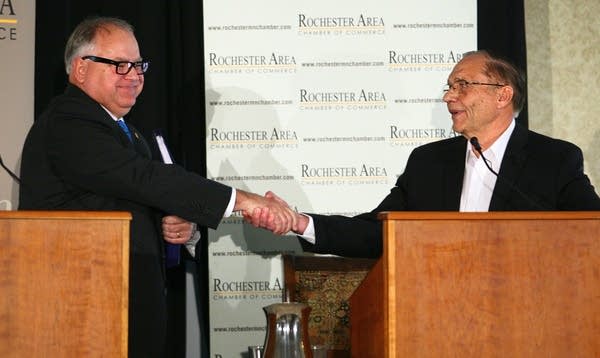Walz and Quist meet for first debate
Go Deeper.
Create an account or log in to save stories.
Like this?
Thanks for liking this story! We have added it to a list of your favorite stories.

A debate between 1st District Congressman Tim Walz and his Republican challenger, former state Rep. Allen Quist, included feisty exchanges as the candidates traded attacks on the economy, jobs and the Affordable Care Act.
More than any other issue during the 90-minute debate, the two candidates sparred over the nation's deficit and spending. The candidates met in the town of Byron, just west of Rochester. The debate was sponsored by the Rochester Area Chamber of Commerce, in partnership with the Post-Bulletin, KTTC-TV and Minnesota Public Radio.
Out of the gate, Quist called the nation's $16-trillion deficit the "900-pound gorilla" in the room. He said Walz's support for the federal stimulus program put the country on a dangerous path.
"We're adding over a trillion dollars each year to the deficit. In two years, 25 cents out of every dollar we collect is going to go for interest," Quist said. "This is financial irresponsibility on steroids. Mr. Walz is right in that middle of the big-spending club."
Turn Up Your Support
MPR News helps you turn down the noise and build shared understanding. Turn up your support for this public resource and keep trusted journalism accessible to all.
Walz made the case that the budget could be addressed with a balanced approach. He said he voted for cuts totaling $2 trillion in the Budget Reconciliation Act.
"The idea of the all-or-nothing Allan talks about has no faith in the American public. That we're worse that Greece and it's collapse. No, we're not," Walz said. "We have the American spirit to deal with this."
Quist, who is from St. Peter, believes he has a shot at recapturing the 1st District congressional seat for Republicans. He lost the GOP endorsement in 2010 to Randy Demmer. He also made two unsuccessful runs for governor in 1994 and 1998. He won the GOP endorsement for governor in 1994 but lost in the primary to incumbent Gov. Arne Carlson. Quist also served in the Minnesota House from 1983 until he retired in 1989.

On job growth, Quist criticized Walz saying more government spending will not improve the economy. He pointed to national unemployment figures that have been over 8 percent for more than three years.
"You're going to grow jobs by having friendly policies for free enterprise. It's all about taking the shackles off of free enterprise," Quist said. "His thinking — Mr. Walz's thinking — is always more government programs, more government spending. Hey, the bank is broke guys. We're not only broke, we're now living on a credit card."
Walz, a former teacher from Mankato, is serving his third term in Congress. He called Quist's views on private enterprise and economic recovery extreme.
"Growing the economy and making sure consumers are spending again, once consumer demand starts to strike up again, you start to see things come in," Walz said. "Revenues go down, growth happens and you pay it down. And that can happen by making sure we're disciplined. It will never happen if it's not balanced."
Walz and Quist also differed in their views on the Affordable Care Act. Quist said the way the plan is structured, hospitals like the Mayo Clinic will suffer because the majority of the plans' tax credits go to people who are not married.
"Married, middle class people who are going to pay most of the bills under the Affordable Care Act have three choices: pay the discriminatory tax — and this is discrimination; divorce and live together, or drop their health insurance," Quist said. "That means many will drop their health insurance. Mayo is not going to get the money it has been promised."
Walz countered Quist's argument by saying the Mayo Clinic will benefit from the Affordable Care Act. He said the plan is not an assault on marriage and only six percent of the public will receive affordability credits.
"What the affordable care act does is it forces the rest of the country to start acting like Mayo, to start delivering on accountable care organizations that come together, to making sure you don't buy a machine just so you can use it to overcharge Medicare and overcharge them," Walz said. "It's making sure that you deliver on exactly what you're going to do and your outcomes are measured.
Walz and Quist are scheduled to meet for two more debates between now and the November election.






